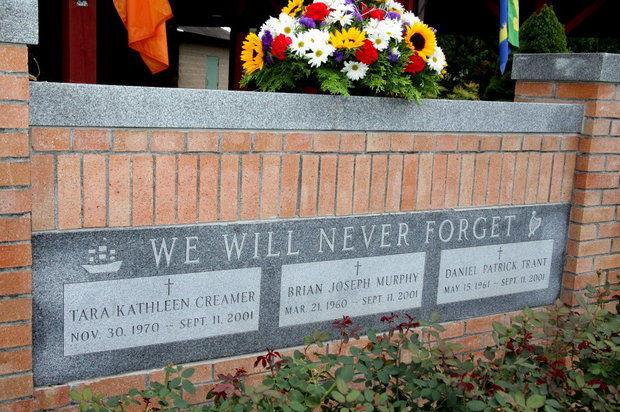By Anne-Gerard Flynn Mass Live

The Sons of Erin memorial, in Westfield, for Tara Creamer, Brian Murphy and Daniel Trant, Westfield residents who died in the terror attacks on September 11, 2001. (Republican File)
Death is rarely easy to accept, but the last few months have brought sudden, and violent death, into the homes of many worldwide, with media images of American journalists being beheaded in the Middle East, the Malaysian Airlines passenger jet, with 298 people on board, in debris, after being shot down over eastern Ukraine, and 50 days of relentless warfare between the Israeli military and Hamas militants.
Closer to home, the Pioneer Valley has grieved with the Longmeadow family of Lt. Col. Morris Fontenot Jr., the highly decorated combat veteran and Air National Guard pilot, whose F-15C crashed Aug. 27, in a wooded area in Virginia, while en route to New Orleans. Fontenot was with the 104th Fighter Wing at Barnes Air National Guard Base in Westfield. Private memorial services will be held on the base on September 7. The valley will grieve, again, with the approach of the anniversary of the terror attacks on September 11, 2001, that took the lives of several area residents.
Is grief, in the aftermath of violent death, different from grief in other circumstances of death?
“Any loss of a loved one is painful, but there are distinctions between the experience of grief, when someone dies from an extended illness or old age, as compared to when death occurs, as the result of an acute medical condition, accident, disaster, suicide, homicide, terrorism or war,” said Patricia P. Martin, a licensed clinical psychologist who practices family and couples therapy in Longmeadow.
Martin added that when “sudden death occurs the griever is not just dealing with loss, but with personal traumatization.”
“The emotional and behavioral characteristics of grief are intensified,” Martin said. “There is no warning, no time to prepare and gradually adjust to the loss. Sudden death deprives the survivors of anticipatory grief. Grief, from sudden loss, is far from standard. With a sudden death there is no opportunity to take care of unfinished business, to make sure to say ‘I love you.'”
Martin said death “involving violence or mutilation often create feelings of fear in the survivors, ranging from terror to anxiety to powerlessness.”
“Often the violence of the act arouses feelings of intense anger and hostility in the mourner,” said Martin, who is also an adjunct professor, in the graduate program in developmental psychology, at Bay Path College in Longmeadow.
Often the violence of the act arouses feelings of intense anger and hostility in the mourner.’
She added feelings can be further effected when there is no body to mourn, and when such death becomes a matter of media attention, or investigation.
“Trauma is magnified, when there is no confirmation of death, or no physical remains discovered. There is great reluctance to relinquish all hope, if there is no proof of a body. It is not denial, but rather disbelief,” Martin said.
“An unexpected, violent loss brings with it other factors that do not often exist when death is anticipated. Not only must survivors cope with feelings of grief, but they often have to cope with intrusions by the media, or with the slowness of the criminal justice system. The public intrusion into private anguish can be very difficult for mourners.”
When it comes to grief, Martin termed it “an individual process,” and one that “should be done at the survivor’s pace and not be dictated by friends or family.”
“Survivors need to be patient with themselves,” Martin said. She added that grievers do “need opportunities to share their memories and grief,” and that this is what heals.
They need support, often just in the form of a supportive hand or a listening ear,” Martin said.” It is not a ‘letting go’ that heals, but rather a ‘remembering’ of the loved one. ”
Martin said there is a lesson in sudden death for survivors in that “they learn that tomorrow is promised no one.”
“They learn to live in the moment and not have unfinished business or unresolved disagreements,” said Martin, what can motivate survivors to “turn their response to the loss to an active experience.”
“Survivors of a loss, from an accident, can campaign for tougher safety regulations, while families of a murder victim could campaign for victim’s rights, or survivors of a sudden loss, from illness, can become active in the fight against the disease,” Martin said. “Some survivors get involved with aiding other victims of disasters, or setting up memorials in their loved one’s name.”

